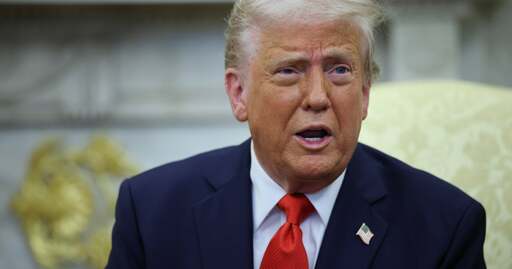The Trump administration can’t immediately revoke the deportation protections and work permits of hundreds of thousands of migrants from Cuba, Haiti, Nicaragua and Venezuela who entered the U.S. legally under a Biden-era program, a federal judge ruled Monday.
U.S. District Court Judge Indira Talwani blocked the Trump administration from moving forward with its plan to terminate the legal status of those migrants on April 24. The administration had warned those affected by its announcement that they would need to self deport by that date or face arrest and deportation by federal immigration agents.
But Talwani suspended the deportation warnings the government had sent and prohibited officials from revoking the legal protection, known as immigration parole, that the Biden administration granted to more than half a million Cubans, Haitians, Nicaraguans and Venezuelans.



His orders can be struck down? You mean like the two times they defied court orders just today, and one of them was a unanimous SCOTUS ruling, with this Court?
That’s the freedom from judicial authority he was given.
Except, that’s NOT the freedom he was given. That’s what he’s doing…but that was not what the Supreme Court ruled.
If they’re doing it, then they have the freedom to do it, until something actually stops them.
No, that’s noncompliance - and by completely misrepresenting the supreme court’s order, they’re playing chicken
The judiciary moves slowly. They have powers they’re hesitant to use - they can order Marshalls to act and see who they obey, or they could deputize a bunch of retired special forces to enforce their decisions outside of the executive branch’s control
It’s not over… Not just yet, anyways. But it’s very, very close - if the judiciary backs down, it’s over. If the administration holds their ground until there’s an armed skirmish, it’s going to get very messy. If both sides keep up this back and forth without forcing a standoff, it could drag on for a while
But it’s not over yet, it’s just not looking good
US Marshals are under DoJ. The only thing that the courts can do is request that Marshals take action. I’m sure Bondi would get right on that.
There’s a hearing today on Abrego Garcia, in the wake of SCOTUS’ unanimous but “maddeningly vague” order to “facilitate” his return, and the administration’s clear failure to do so.
It does, and they’re taking every advantage of that to log jam that process even more, and do whatever they want in the meantime. There needs to be rapid and effective action now, and there’s only one more box of liberty to get it from.
Yes, the Marshalls are. But hey could find Marshalls who take their oath seriously, or they could deputize whoever they like to enforce the court’s ruling
That’s wrong. The request from the court doesn’t just go to the US Marshals. It goes to DoJ.
Also wrong. The US Marshals Service can deputize Marshals. The courts cannot.
Source
They can do this, there’s a strong legal argument for it that goes far beyond just this… And where we are now that’s enough she could act
It wouldn’t make that person a marshall, they’d be a deputy. They’re limited in the scope of what they can do, I’m not sure if they could be paid or how, it might break a whole bunch of norms - but it can be done
Fair enough - can. Won’t, but can.
The SCOTUS ruling you’re referring to, while still a terrible precedent as a matter of policy, did not give him a blanket legal right to disregard court orders. He’s just doing it anyway.
If he is immune from criminal prosecution for “official acts”, it is fully legal for him to defy court orders about “official acts”. That ruling gave him unchecked power. That ruling was our Enabling Act.
Maybe not technically, but it effectively did. There’s no material difference.
You’re falling prey to the idea that in theory, theory and practice are identical, but in practice, theory and practice can often diverge sharply.